
The Importance of Canine Dental Care for Your Dog’s Overall Health
Are you ready to get your dog’s smile shining? Look no further than our guide to canine dental care! From brushing to dental treats, we’ve got all the tips and tricks you need to keep your pup’s teeth healthy and strong. With our help, you’ll be able to tackle common dental problems and prevent serious issues before they start.
The Connection Between Dental Health and Overall Wellbeing
Firstly, canine dental care plays a crucial role in your dog’s overall health. Poor dental hygiene can lead to numerous health issues. Consequently, bacteria can enter the bloodstream, causing infections or damaging vital organs.
- Heart disease
- Kidney issues
- Liver problems
- Respiratory infections
Ultimately, prioritizing your dog’s dental care can prevent these issues and ensure a longer, healthier life.
The Impact of Dental Health on Nutrition
Secondly, proper dental care affects your dog’s ability to chew and digest food. Painful teeth or gums may cause difficulty in eating. Furthermore, they might avoid certain foods, leading to nutritional deficiencies.
- Weight loss
- Weak immune system
- Poor coat condition
- Reduced energy levels
In conclusion, maintaining your dog’s dental health ensures they receive the necessary nutrients to thrive.
Canine Dental Care and Behavior
Surprisingly, your dog’s dental health influences their behavior as well. Indeed, dental pain might make your dog irritable or aggressive. Additionally, they may avoid playing with toys or engaging in activities they once enjoyed.
- Changes in temperament
- Reduced playfulness
- Avoidance of touch
- Increased sensitivity
In short, proper dental care can help maintain your dog’s happiness and sociability.
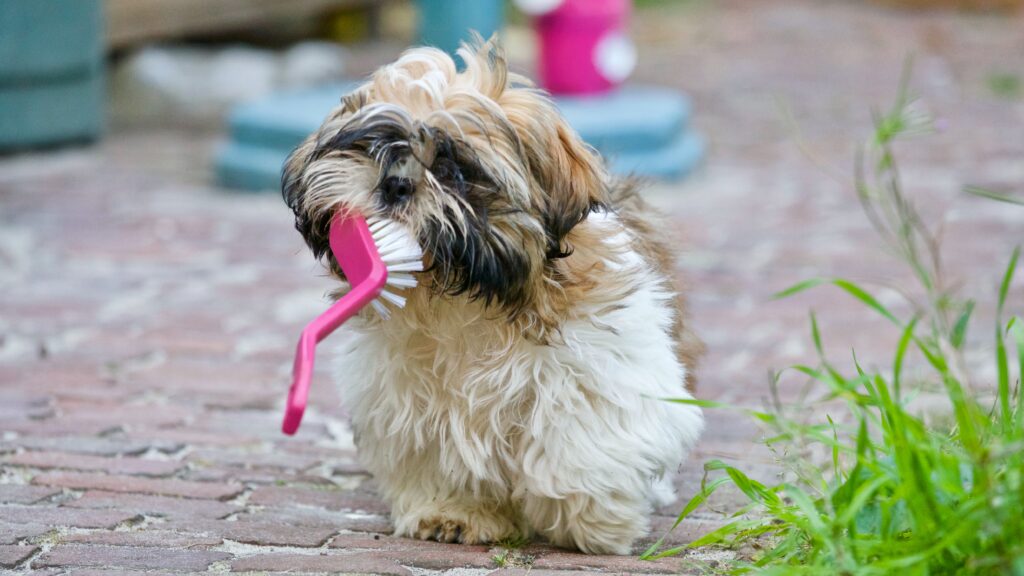
The Role of Dental Health in Preventing Bad Breath
Undoubtedly, bad breath is an unpleasant issue for both dogs and their owners. Therefore, proper canine dental care can help eliminate bad breath caused by plaque, tartar, or gum disease.
- Reduced plaque buildup
- Healthier gums
- Fresher breath
- Improved owner-dog interactions
In essence, maintaining good dental hygiene can lead to a more enjoyable relationship between you and your furry friend.
H5: Saving Money on Veterinary Bills
Lastly, investing in canine dental care can save you money in the long run. Indeed, treating dental issues can be costly, especially if they require extractions, surgery, or long-term medication.
- Lower vet bills
- Reduced need for dental procedures
- Prevention of costly health issues
- Peace of mind for pet owners
To sum up, regular dental care can be a cost-effective way to ensure your dog’s overall health and wellbeing.
H5: Boosting Your Dog’s Quality of Life
Ultimately, prioritizing canine dental care enhances your dog’s quality of life. A healthy mouth allows them to eat comfortably, interact with their environment, and engage in activities they love.
- Pain-free eating
- Stronger immune system
- Enhanced mental and physical wellbeing
- Increased life expectancy
In conclusion, by focusing on dental care, you can provide your dog with the best possible life.
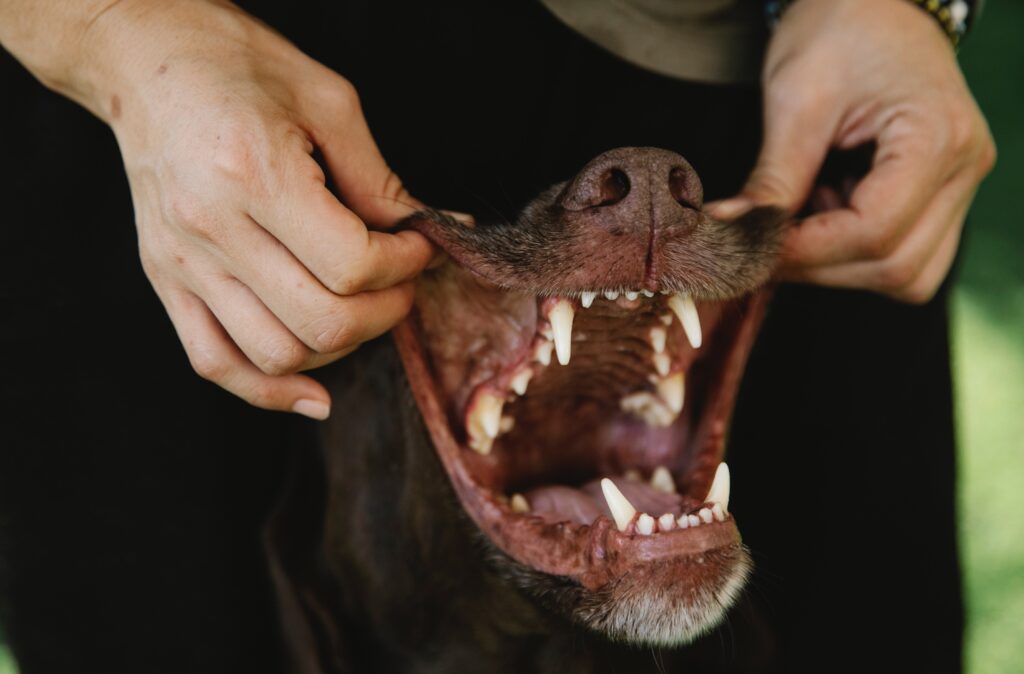
A Step-by-Step Guide to Brushing Your Dog’s Teeth
Gathering the Necessary Supplies
Firstly, gather the right tools for successful canine dental care. Ensure you have a toothbrush and toothpaste specifically designed for dogs.
- Dog toothbrush
- Dog toothpaste
- A towel or cloth
- Dental wipes (optional)
In short, having the proper supplies will make brushing your dog’s teeth an easier and more effective process.
Finding a Comfortable Position
Next, find a comfortable position for both you and your dog. This might be on the floor, a table, or even on your lap.
- Choose a quiet, low-distraction area
- Sit or stand beside your dog
- Support your dog’s head gently
- Remain calm and reassuring
In conclusion, a comfortable position and environment will make the process smoother for you and your dog.
Introducing the Toothbrush and Toothpaste
Before starting, let your dog get used to the toothbrush and toothpaste. Familiarity will help make the experience more pleasant.
- Allow your dog to sniff and lick the toothbrush
- Offer a taste of the toothpaste
- Praise and reward your dog’s curiosity
- Be patient and gentle
Ultimately, helping your dog become familiar with the tools ensures a positive brushing experience.
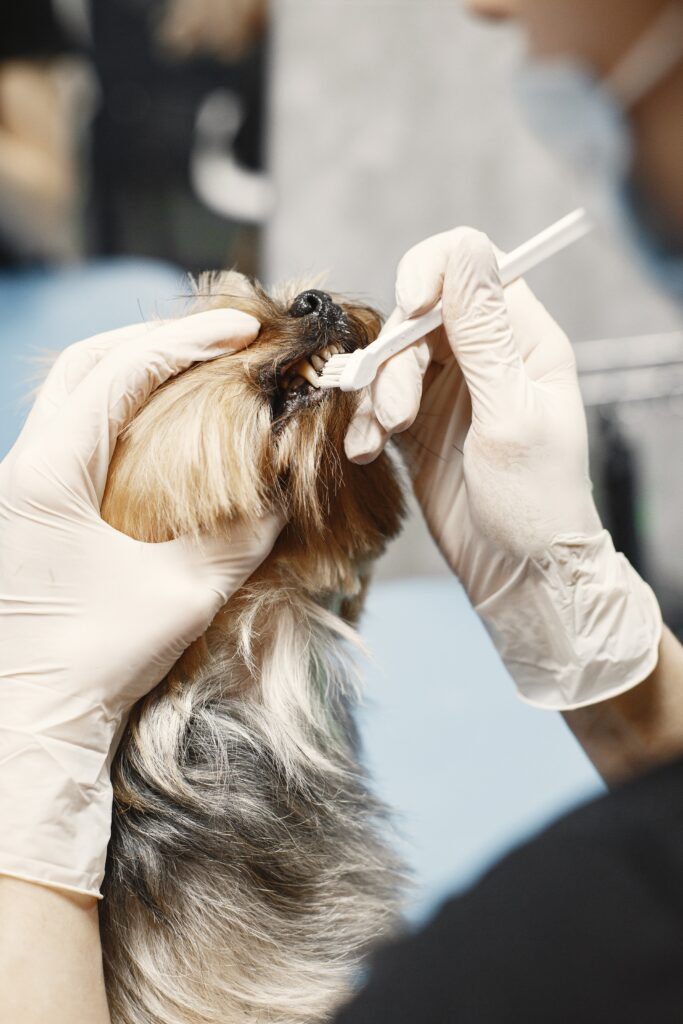
Brushing the Teeth
Now it’s time to brush your dog’s teeth. Use a gentle, circular motion and focus on the gumline.
- Start with the front teeth
- Gradually work your way to the back teeth
- Brush both the outer and inner surfaces
- Aim for 30 seconds
Addressing Your Dog’s Behavior During Brushing
As you brush your dog’s teeth, it’s crucial to address any challenging behaviors that may arise.
- Remain calm and patient
- Use positive reinforcement (praise, treats)
- Take breaks if your dog becomes agitated
- Gradually increase brushing duration
By addressing your dog’s behavior, you can make canine dental care a more enjoyable experience for both of you.
Maintaining a Consistent Dental Care Routine
Lastly, maintain a consistent dental care routine for your dog to ensure long-lasting oral health.
- Brush your dog’s teeth daily, or at least 2-3 times per week
- Schedule regular veterinary dental check-ups
- Incorporate dental treats and toys into your dog’s routine
- Keep track of your dog’s oral health progress
In summary, a consistent dental care routine is essential for maintaining your dog’s overall oral health and preventing future dental issues.
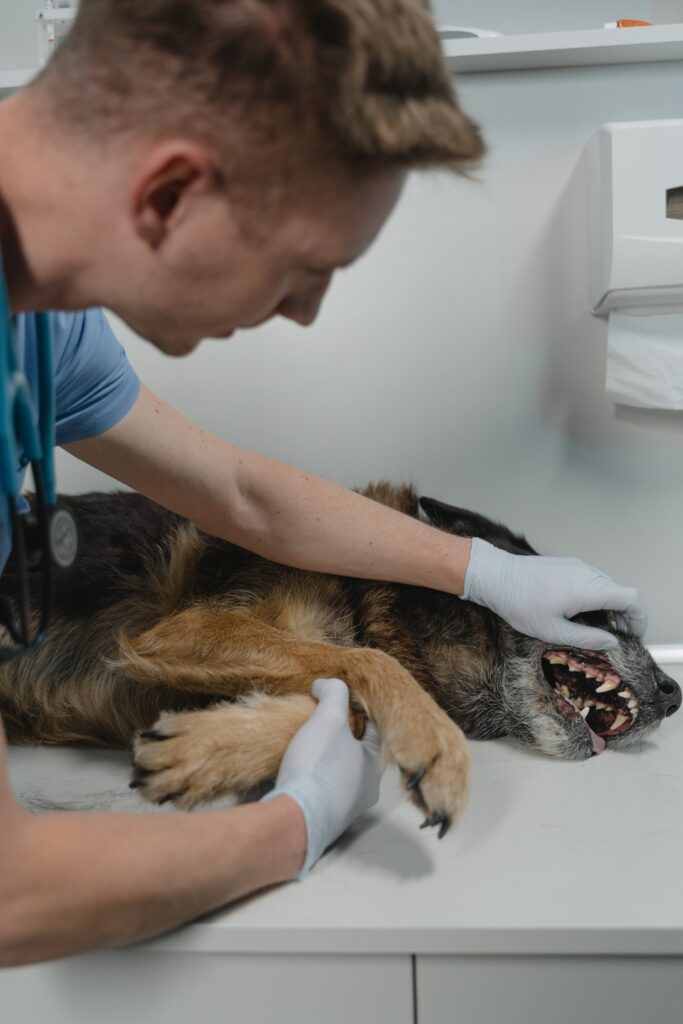
Identifying and Preventing Common Canine Dental Problems
Recognizing Common Canine Dental Issues
To prevent canine dental problems, it’s crucial to recognize common issues early on.
- Bad breath: Often a sign of underlying dental issues
- Discolored teeth: Indicative of plaque and tartar buildup
- Swollen, red gums: Possible sign of gum disease
- Loose or broken teeth: May indicate dental trauma or disease
By identifying these issues, you can address them before they worsen.
Providing a Balanced Diet for Dental Health
A balanced diet plays a vital role in maintaining your dog’s dental health.
- Include high-quality, easily digestible ingredients
- Limit sugar and carbohydrates to reduce plaque formation
- Provide size-appropriate kibble for natural teeth cleaning
- Consult your veterinarian for diet recommendations
With the right diet, you can promote better dental health and prevent common issues.
Regularly Inspecting Your Dog’s Mouth
Regular mouth inspections help identify potential dental problems early.
- Check for signs of swelling, redness, or bleeding gums
- Examine teeth for cracks, fractures, or discoloration
- Look for growths or lumps inside the mouth
- Consult your vet if you notice any abnormalities
Through regular inspections, you can address dental issues promptly.
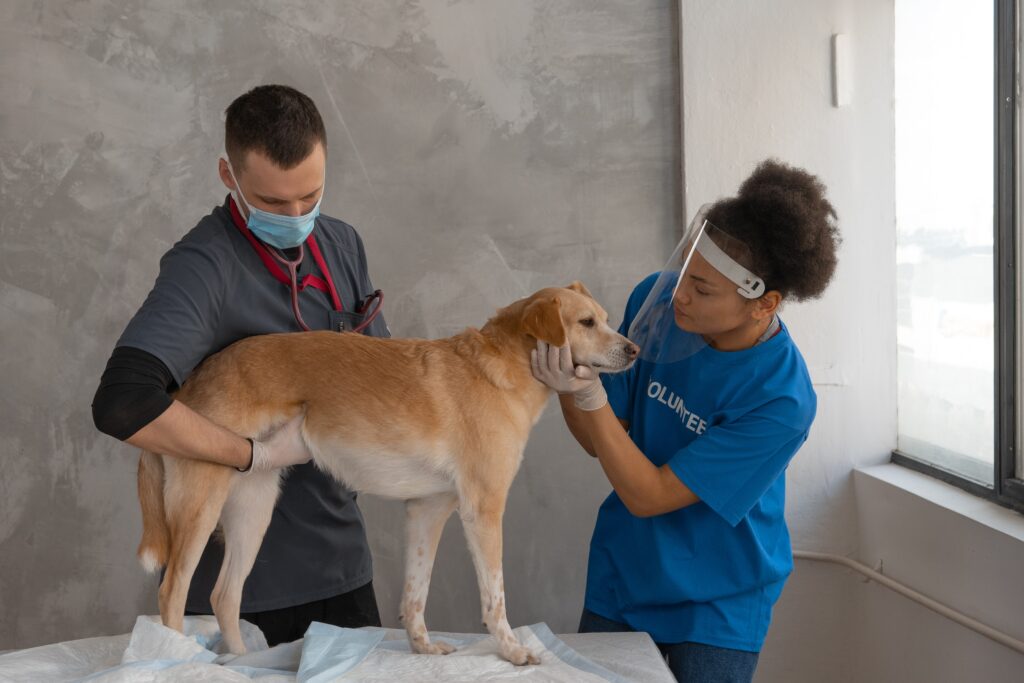
Scheduling Routine Veterinary Dental Checkups
Routine vet checkups play an essential role in preventing canine dental problems.
- Schedule dental checkups at least once a year
- Ask your vet about dental cleaning services
- Follow your vet’s recommendations for at-home care
- Address any dental concerns with your vet
By scheduling regular dental checkups, you can keep your dog’s teeth healthy and strong.
Encouraging Chewing to Promote Dental Health
Chewing is a natural way for dogs to clean their teeth and promote healthy gums.
- Provide safe chew toys designed for dental health
- Offer dental chews that help reduce plaque and tartar
- Choose chews appropriate for your dog’s size and chewing habits
- Monitor your dog while chewing to prevent choking hazards
By encouraging chewing, you can help maintain your dog’s dental health between cleanings.
Establishing a Dental Care Routine
Creating a consistent dental care routine is essential for preventing common canine dental problems.
- Brush your dog’s teeth daily using a canine toothbrush and toothpaste
- Use dental wipes or sprays for additional cleaning
- Implement a dental care routine at a young age for easier acceptance
- Reward your dog with praise or treats after dental care sessions
By establishing a consistent dental care routine, you can help prevent dental issues and promote a lifetime of healthy teeth and gums.
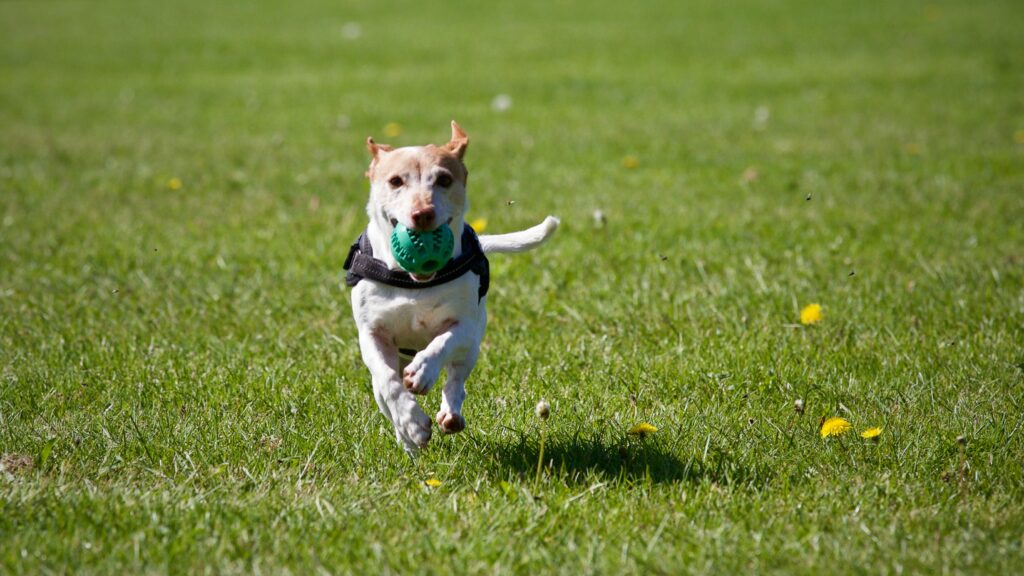
Choosing the Right Dental Treats and Toys
Factors to Consider When Choosing Dental Treats
Selecting the right dental treats for your dog is crucial for effective canine dental care.
- Opt for treats with a Veterinary Oral Health Council (VOHC) seal
- Choose treats appropriate for your dog’s size and chewing habits
- Consider your dog’s dietary restrictions and allergies
- Assess the treat’s texture and ingredients for dental benefits
By considering these factors, you can ensure the dental treats contribute positively to your dog’s oral health.
The Benefits of Dental Toys for Dogs
Dental toys can play a significant role in maintaining your dog’s dental hygiene.
- Offer toys that promote chewing and saliva production
- Look for toys with grooves and textures that clean teeth and massage gums
- Choose durable toys made from non-toxic materials
- Rotate toys regularly to maintain your dog’s interest
Incorporating dental toys into your dog’s routine can help support their overall dental health.
Creating a Canine Dental Care Plan with Treats and Toys
A well-rounded dental care plan includes both treats and toys to maximize your dog’s oral health.
- Combine dental treats and toys for a comprehensive approach
- Monitor your dog’s chewing habits and adjust the plan accordingly
- Consult your veterinarian for recommendations on treats and toys
- Regularly inspect treats and toys for wear, replacing them when necessary
By creating a dental care plan that includes both treats and toys, you can ensure your dog’s teeth and gums stay healthy.
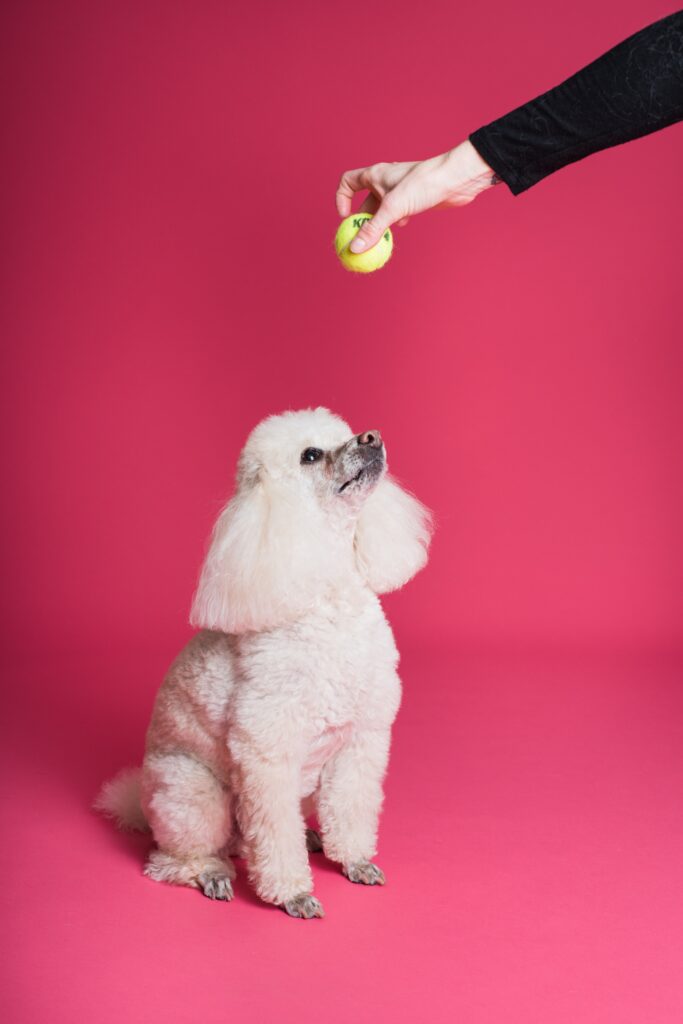
Understanding the Limitations of Dental Treats and Toys
It’s essential to recognize that dental treats and toys have their limitations in canine dental care.
- Treats and toys should not replace regular tooth brushing
- Overconsumption of treats can lead to weight gain and other health issues
- Some toys may not be suitable for all dogs, especially those with dental problems
- Chewing on toys excessively can cause tooth fractures and other dental injuries
Being aware of these limitations helps to use dental treats and toys effectively without compromising your dog’s health.
Safe Use of Dental Treats and Toys
To ensure the safe use of dental treats and toys for your dog, follow these guidelines:
- Supervise your dog when using dental treats and toys
- Remove any small or broken pieces that pose a choking hazard
- Discard treats or toys that show signs of excessive wear
- Limit the number of dental treats to avoid overconsumption
By following these safety guidelines, you can support your dog’s dental health while minimizing potential risks.
Engaging in Regular Dental Check-ups
In addition to dental treats and toys, regular check-ups with a veterinarian are vital for optimal canine dental care.
- Schedule annual dental check-ups with your veterinarian
- Address any dental concerns or issues promptly
- Follow your veterinarian’s recommendations for dental care
- Consider professional dental cleanings if necessary
By engaging in regular dental check-ups, you can ensure your dog maintains good oral health and receives appropriate dental care when needed.
Integrating Dental Treats and Toys into Your Dog’s Routine
Integrating dental treats and toys into your dog’s routine can help maintain their dental health. Here’s how:
- Establish a daily routine for using dental toys and offering dental treats
- Rotate between different toys to keep your dog engaged and interested
- Offer dental treats as a reward for good behavior or during training sessions
- Ensure that dental toys and treats are age and size-appropriate for your dog
By incorporating dental treats and toys into your dog’s daily routine, you can support their dental health while also providing mental stimulation and entertainment.
Selecting High-Quality Dental Treats and Toys
When it comes to canine dental care, the quality of dental treats and toys matters.
- Choose dental treats with the Veterinary Oral Health Council (VOHC) seal of approval
- Opt for toys made from non-toxic, durable materials
- Research and read reviews on products before purchasing
- Consult with your veterinarian for recommendations on dental treats and toys
By selecting high-quality dental treats and toys, you can ensure that your dog receives the best possible care for their teeth and gums.

Professional Canine Dental Care: When to Seek a Vet’s Help
Recognizing Signs That Your Dog Needs Professional Dental Care
Canine dental care goes beyond home maintenance. Sometimes, professional help is necessary. Recognize these signs:
- Bad breath that persists despite home care
- Swollen, red, or bleeding gums
- Difficulty eating or loss of appetite
- Loose or broken teeth
If you notice any of these signs, it’s essential to consult your veterinarian for an assessment and appropriate treatment.
Scheduling Routine Veterinary Dental Checkups
Routine dental checkups play a crucial role in your dog’s dental health. Consider these guidelines:
- Schedule annual dental checkups for your dog
- Increase frequency for breeds prone to dental issues
- Monitor your dog’s oral health between visits
- Address any concerns with your veterinarian promptly
By scheduling regular dental checkups, you ensure that your dog’s teeth and gums stay healthy.
Understanding Professional Dental Cleaning Procedures
Professional dental cleanings are vital for maintaining your dog’s dental health. Here’s what to expect:
- Your veterinarian will perform a thorough oral examination
- Your dog may require anesthesia for a safe and comfortable cleaning
- The veterinarian will remove plaque and tartar buildup
- Any necessary extractions or treatments will be performed
Understanding the dental cleaning procedure can help alleviate any concerns you may have about your dog’s dental care.
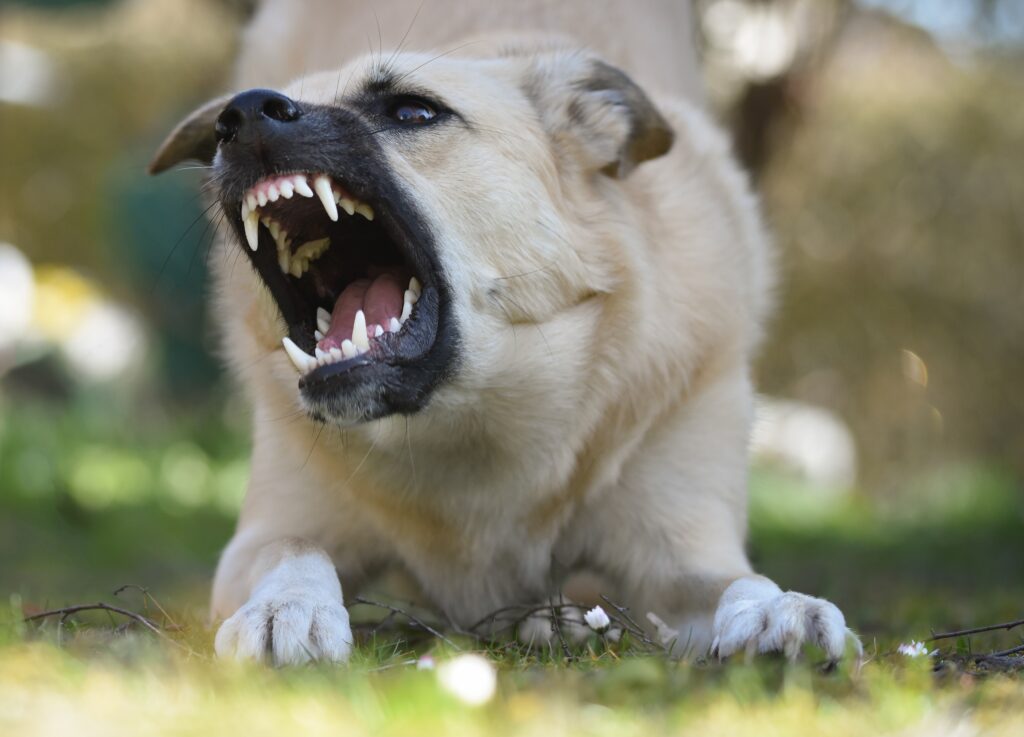
The Benefits of Professional Canine Dental Care
Professional dental care offers numerous benefits for your dog. Some advantages include:
- Early detection of dental issues
- Prevention of severe dental problems
- Improved breath and overall oral health
- Increased comfort while eating
Incorporating professional dental care into your dog’s routine ensures a happier and healthier life.
The Role of Dental X-Rays in Canine Dental Care
Dental X-rays play a critical part in your dog’s dental care. Consider these points:
- X-rays detect issues hidden below the gum line
- They identify dental problems early, before they worsen
- Veterinarians can create a treatment plan based on the findings
- Dental X-rays are typically performed during routine checkups
By using dental X-rays, your veterinarian can provide comprehensive canine dental care.
When to Seek Emergency Dental Care for Your Dog
In some cases, emergency dental care may be necessary. Watch for these urgent signs:
- Severe pain or distress when eating
- Significant bleeding from the mouth
- Swelling or trauma to the face or jaw
- Sudden onset of excessive drooling
If you observe any of these symptoms, seek immediate veterinary attention to ensure your dog’s well-being.
Conclusion
Remember, taking care of your dog’s dental health isn’t just about having a pretty smile – it’s also essential for their overall well-being. Regular check-ups with your vet and consistent at-home care can make a huge difference in your pup’s health and happiness. So why wait? Start incorporating these canine dental care tips into your routine today!